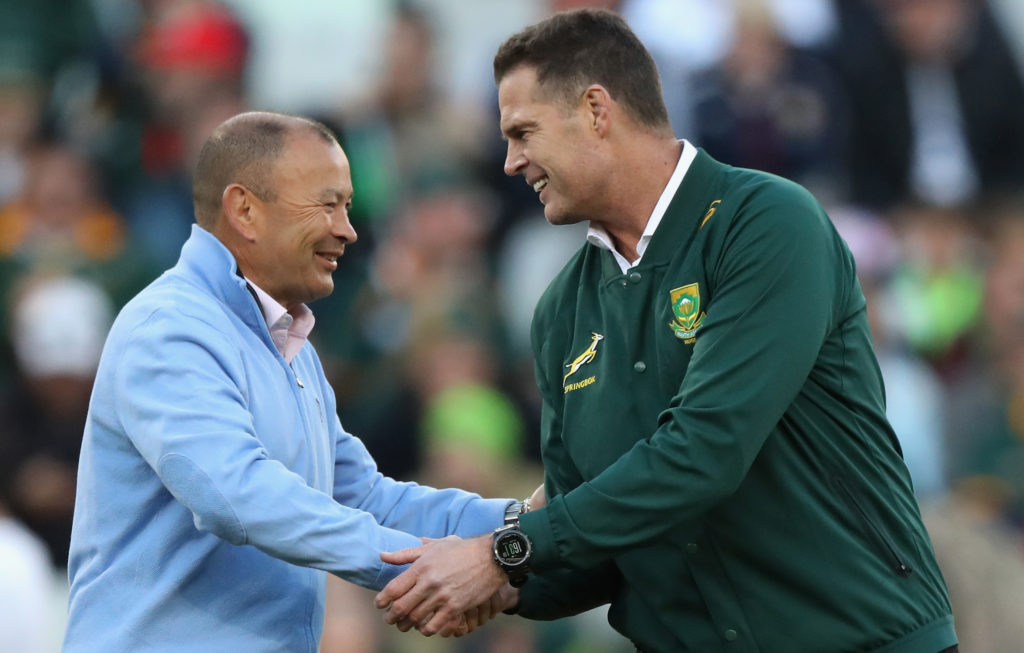Rassie Erasmus’ tactical nous and innovation will be put to the ultimate test when he goes up against grandmaster Eddie Jones in the World Cup final, writes JON CARDINELLI in Tokyo.
‘I’m not too worried, mate,’ Jones told me when we caught up for a coffee in Cape Town last year.
At that stage, Jones was copping criticism from all quarters. England had just lost the series to South Africa and were on a five-game losing streak. His Cheshire cat smile, though appeared at odds with his situation.
Jones talked openly about his admiration for Rassie Erasmus and his promising group of Springbok players. He didn’t seem fazed by England’s defeats in Johannesburg and Bloemfontein.
Jones felt that England would hit back in Cape Town – which they did – and overcome the Boks at Twickenham later in the season – which they also did.
He told me that he was building toward the World Cup and that his team might surprise a few of the southern hemisphere sides at the global tournament itself. That prophecy came to pass, with England hammering Australia in the quarter-finals and New Zealand in the semis.
ANALYSIS: The new suffocate-and-strangle game
The latter playoff witnessed a particulary remarkable display of tactical variation and execution. As All Blacks coach Steve Hansen said afterwards, there was a lot of intelligence behind England’s physical approach.
Jones also predicted that the Boks would become a world force once more. Since then, the Boks have beaten the All Blacks in New Zealand, won the Rugby Championship and have progressed to the World Cup final in Japan.
Jones and Erasmus have redeemed their respective teams, albeit it in different ways. The British press has already labelled the recent win against the All Blacks as one of the greatest England performances of all time. Erasmus has revived the reputation of a South African team that was ranked seventh in the world at the start of 2018, and like Jones is in the running for the World Rugby Coach of the Year award.
Jones has been in this position before. As Australia coach, he watched Jonny Wilkinson kick a drop goal in extra time to win the 2003 World Cup final. Four years later, he was on the winning side as part of Jake White’s Bok coaching staff.
Earlier this week, I asked Erasmus how the current Bok coaches and players – none of whom, bar the enigmatic Frans Steyn, has experienced a World Cup final – planned to negotiate the challenge. The Boks may be up for the physical contest as well as the inevitable kicking duel, but do they have the ability to produce something special at the crucial moment?
While he admitted that he didn’t have all the answers, Erasmus suggested that the Boks may have a few tricks up their sleeve. They certainly aren’t going to break down or compromise John Mitchell’s defensive system through sheer brawn alone.
Having presided over four Tests against the Boks, Jones will have a good idea about their strengths and weaknesses. Expect England to kick on the Bok back three and feed off any scraps. If Willie le Roux doesn’t rise to the occasion and diffuse the high bombs, England will make telling inroads.
ALSO READ: Bok terrier to rattle England’s big dogs
On the other hand, a dominant forward display by the Boks will allow Faf de Klerk and Handre Pollard to dictate the flow of the game. And if the likes of Le Roux are receiving the ball deep in opposition territory it is England that will have cause to panic.
Cheslin Kolbe may well be Erasmus’ trump card. How the the coach harnesses the explosive runner’s talents, from set phase and from broken play, will also influence the flow of the game.
They say that World Cup finals are dull and forgettable affairs. This one, however, could witness a chess battle for the ages as two of rugby’s sharpest minds are forced to innovate and adapt from the first whistle to the last.
Photo: Gallo Images





